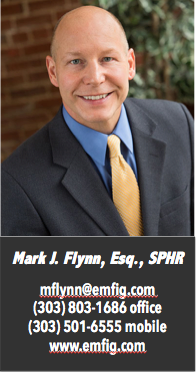 Today’s thought-provoking guest blog is from my colleague in Workplace Investigations Group, Mark Flynn, Esq., SPHR. Mark is an employment attorney in Denver, Colorado and founder of Employment Matters LLC and Flynn Investigations Group (“EMFIG”). Mark started EMFIG to continue his specialization in conducting workplace investigations and providing counseling and training seminars on employment matters. He views compliance and conflict resolution as fundamental to a preventive law approach to promote effective, prosperous workplace and school environments. Previously, Mark worked at a 3,000-member employers association for over 18 years, where he developed and managed a team of investigators performing over 100 investigations annually.
Today’s thought-provoking guest blog is from my colleague in Workplace Investigations Group, Mark Flynn, Esq., SPHR. Mark is an employment attorney in Denver, Colorado and founder of Employment Matters LLC and Flynn Investigations Group (“EMFIG”). Mark started EMFIG to continue his specialization in conducting workplace investigations and providing counseling and training seminars on employment matters. He views compliance and conflict resolution as fundamental to a preventive law approach to promote effective, prosperous workplace and school environments. Previously, Mark worked at a 3,000-member employers association for over 18 years, where he developed and managed a team of investigators performing over 100 investigations annually.
Good Will Hunting and Workplace Investigations: Vigilance Against Bias
by Mark Flynn, Esq., SPHR
I like to ask the “favorite movie” question and Good Will Hunting is a popular pick in my experience. To Good Will Hunting fans I sometimes present a “did you notice” question.
It starts with recollection of a favorite scene in the movie – when Will (Matt Damon) steps into Chuck’s (Ben Affleck’s) conversation at a bar with a Harvard Grad student intent on sabotaging Chuck’s attempt to meet two “Harvard hunnies” (Minnie Driver and friend). Will proceeds to dress him down as a parrot of published works on American history without an original thought of his own. Juxtapose that scene with Sean (Robin Williams) and Will’s “Taster’s Choice moment between guys” on a bench overlooking a pond. Will aggravates Sean to violence in their previous meeting, but now Sean explains finding calm after realizing that Will doesn’t know what he is talking about, even if Will’s genius enables his command of any subject still short of personal experience: “I can’t learn anything from you that I can’t read in a [expletive] book.” It’s the same valid criticism that Will levels at the Harvard Grad student and provides a lesson in humility.
Discovering the hypocrisy of our own thinking or behavior can make for profound revelation. Ideally, it inspires responsible cautiousness and self-examination. The life lesson is a great tool for workplace and school investigators – and managers and executives too.
Conducting workplace investigations demands humility more than self-assurance. The most effective and reliable investigators perceive themselves small rather than big.
Starting from a stance of “I don’t know” helps avoid assumptions and drives the initial, primary goal of hearing each side of the story before reaching conclusions. From there, acknowledge your susceptibility to biases. Biases derive from implicit reliance on stereotypes born from individual life experiences, environment, and culture. Every point of view is a view from a point and no person escapes the human condition. Any absolute denial of personal prejudice, conscious or unconscious, is at best unpersuasive and at worst dishonest.
The on-going study of bias is fascinating. The multiple forms of cognitive bias, like Confirmation Bias and Halo Effect, as well as Implicit Association Tests and Heuristics are engrossing, even to laymen – at least this layman. The reliability of implicit bias evidence in employment discrimination litigation is far from settled with strong opinions on both sides of the issue, and separate legal-eagle debate over the centrality of causation versus discriminatory intent for disparate treatment claims. In any case, the good news is that social science suggests that individuals can control even implicit biases with various forms of conscious effort – including articulating opinions or decisions in writing (my personal favorite). Self-awareness and recognition of our essential subjectivity supports vigilance against bias in the workplace, investigations, and in life.
